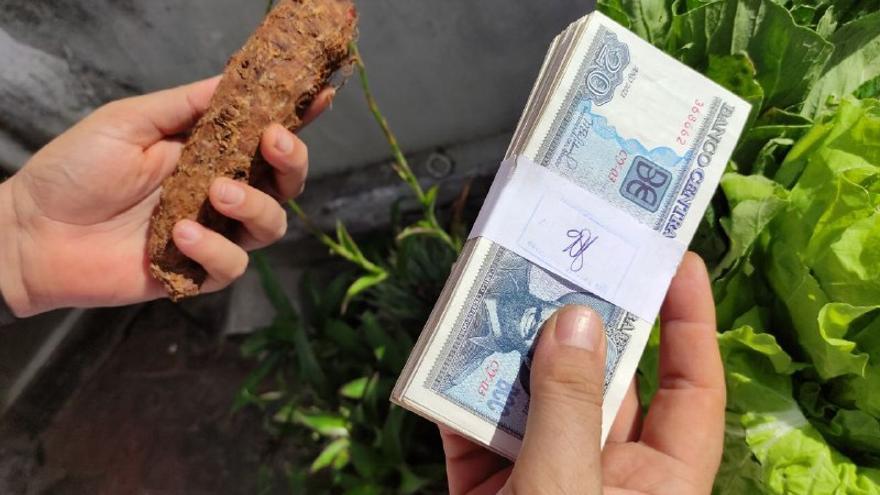
![]() 14ymedio, Juan Diego Rodríguez, Havana, 14 January 2021 — “There’s taro, there’s taro!” an informal vendor insistently proclaimed this Thursday at the San Rafael street market in Central Havana. The announcement quickly raised spirits among customers in the crowded surroundings.
14ymedio, Juan Diego Rodríguez, Havana, 14 January 2021 — “There’s taro, there’s taro!” an informal vendor insistently proclaimed this Thursday at the San Rafael street market in Central Havana. The announcement quickly raised spirits among customers in the crowded surroundings.
In recent months, it is difficult to find in recent months the tuber that is well known to most Cubans since childhood. Boiled, with sauce, mixed with some milk or submerged in a dish of beans, taro is used as a transition food between breastfeeding and solid food, but inflation has made this food disappear, which, until recently, also reigned in fried foods and purées.
“Yesterday you told me 60 pesos a pound and today it’s 70. Does the price go up from one day to the next?” An indignant customer complained to the merchant. The initial expectation was diluted when the buyers learned the price and the seller responded acidly: “It’s not my fault! Complain to Murillo!” As much as the Cuban government has banished the most visible face of the ’Ordering Task’ to his new position in Tabacuba, the population does not forget the person they identify as responsible for the unstoppable rise in prices.
For decades, Taro has been not only a staple children’s diets, but of anyone with gastric problems. Cuban doctors have recommended it for years in purées for hospitalized, sick or elderly patients with swallowing difficulties. For decades, a quantity of this food for the chronically ill was sold on the rationed market, but that is now a thing of the past.
Now taro is almost exclusively found in privately managed markets. “The farmers want to charge the transporters 29 pesos a pound for taro, because they say that their expenses have increased. In turn, the transporters also want to earn their share,” a vendor explains to 14ymedio. “If taro reaches my hands at 40 pesos or more, how much am I going to sell it for in the market?”
As with most foods, the increase in production costs makes it difficult for the crops to thrive, and taro has its peculiarities. “It demands a lot of water, it likes abundant irrigation,” says Manuel, a producer from the province of Villa Clara.
“Electricity costs have skyrocketed and now I spend much more money to pump the amount of water that a taro field needs,” he details. “Although it is a strong product and you don’t need boxes to move it, right now it’s a headache to buy bags, because the few that exist, when you find them, have also gone up a lot.”
Fuel, another of the products that is frequently in short supply in Cuba, but which has become impossible since 2019, is another factor. “The producer who is in charge of removing their crop from the fields cannot lower the price of 30 pesos per pound, and with that price he is already making losses. I give mine to an intermediary and when he takes it away, it is no longer my problem. He is the one who sets the price in the market,” adds Manuel.
Consumers are annoyed at a rise in prices that especially affects the most vulnerable people in the household. “My mother has been without a dental prosthesis for three years, because first there was no material to make one. Then the pandemic came, and the whole dental issue is almost paralyzed,” explains a resident of the Havana neighborhood of Cerro.
“My mother’s daily meals are purees based on taro or other foods such as pumpkin or sweet potato,” she adds. “At this price I cannot afford it and I am having to look for other alternatives, but they are not very healthy,” she acknowledges. “My daughter is finishing breastfeeding her little girl and she can’t afford these prices to transition her either.”
In private restaurants and digital sites that sell their products to emigrants who buy it for their families on the Island, the product continues to be offered. “Taro puree with a good Creole sauce and crunchy chips,” announces a paladar (private restaurant) that recommends not to stop “trying the fried foods.” To rediscover the flavor that until recently was the star of dishes for the elderly and babies, now you need to have dollars.
____________
COLLABORATE WITH OUR WORK: The 14ymedio team is committed to practicing serious journalism that reflects Cuba’s reality in all its depth. Thank you for joining us on this long journey. We invite you to continue supporting us by becoming a member of 14ymedio now. Together we can continue transforming journalism in Cuba.
